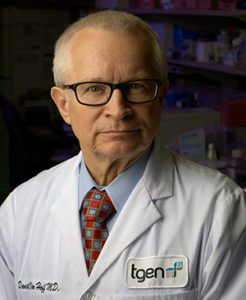The Flinn Foundation in 2002 launched Arizona’s Bioscience Roadmap, which has guided the state’s growth in the biosciences over the past two decades. The Translational Genomics Research Institute, or TGen, began that same year in downtown Phoenix and quicky established itself as a leader in translational research and precision medicine—and an anchor of Arizona’s new bioscience initiative.
This year marks the 20th anniversary of both Arizona’s Bioscience Roadmap and TGen, which through its cutting-edge patient treatment, ground-breaking research, and commercialization, has played a key role in enabling Arizona’s bioscience sector to perform today at historically high levels.
Jeffrey Trent, Ph.D., TGen’s president and research director and previously the scientific director of the National Human Genomic Research Institute, had the vision to create such an organization—and to do so in his native Arizona.
“The opportunity we had to use genomics and genetics directly for medical benefit and the feeling that a nonprofit research institute can sit in between industry, academia, and government was really what drove me to consider Arizona,” Trent said. “And ultimately the Flinn Foundation and their support through Arizona’s Bioscience Roadmap and others was critical to my making a decision to have TGen located in Arizona.”
Trent says TGen has truly been at the vanguard of introducing what is now called precision medicine to directly determine which treatment is best for a patient.

Research projects have ranged from the work of Dr. Daniel Von Hoff in treating pancreatic cancer to the online MindCrowd project, now part of a $60 million collaboration with the University of Arizona and other institutions, to better understand and inform the aging process through the Precision Aging Network. In addition, TGen has a 20-year affiliation with Salt River Pima-Maricopa Indian Community and was recently awarded a $20 million grant from National Cancer Institute to do the largest study yet undertaken with indigenous populations, using genomics as a tool to better inform treatment.

TGen since its inception has worked to commercialize its tools and technologies, and, with the help of chief operating officer Tess Burleson, has spun out about 20 companies over the past 10 years, with six exits. Trent said about 5% of their effort today is focused on commercialization, with the goal over the next five years to increase that figure to closer to 30%.
TGen works closely with the state’s three universities and academic institutions around the country, and since 2016 has been part of City of Hope, the third largest clinical cancer network in the United States, allowing it to play a greater role in infusing science and genomics and genetic medicine into care. Trent said that over its second 20 years, TGen expects to focus on further leveraging and expanding work that directly impacts patients.